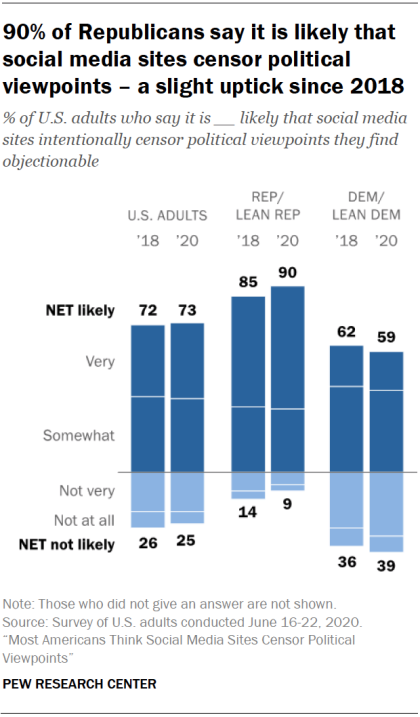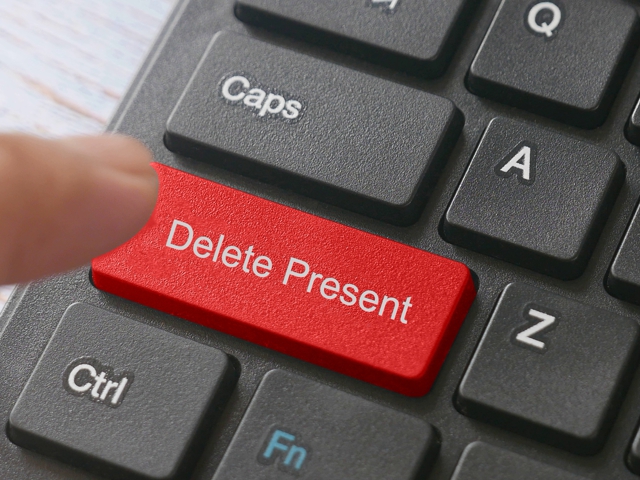To the victors go the spoils, they say, but in the siege of online censorship over freedom of thought, the statues are being toppled before they’ve even laid the foundation, and history is being re-written in real-time.
“We have found it better to trust the public judgment, rather than the magistrate, with the discrimination between truth and falsehood” — Thomas Jefferson
Social media companies like Facebook fuel polarization, and they were created for mass deception intentionally by design.

Their algorithms are trained to keep people on the platform as long as possible as they continue to amplify division, and the majority of the American people believe social media sites intentionally censor political viewpoints.
As of June, 2020, roughly three-quarters of US adults said it was very (37%) or somewhat (36%) likely that social media sites intentionally censor political viewpoints that they find objectionable. Just 25% believed this was not likely the case, according to a PEW Research Center survey.
Citizens of a free society can only make informed decisions based on the information that is available to them.
But when information is suppressed and skewed, as with censorship in the name of fighting online misinformation, then the people are stripped of their right to review and assess the information for themselves.
“With the discrimination between truth and falsehood […] the public judgment has performed that office with wonderful correctness” — Thomas Jefferson
In fact Thomas Jefferson wrestled with this conundrum. He knew that misinformation was a scourge among the press, but logic and reason dictated to him that it was better to allow the free exchange of ideas and to let the public decide on their merits rather than to censor anyone’s voice.
Jefferson penned a letter to Marc Auguste Pictet on February 5, 1803, in which he stated:
Our newspapers for the most part, present only the caricatures of disaffected minds.
Indeed the abuses of the freedom of the press here have been carried to a length never before known or borne by any civilized nation, but it is so difficult to draw a clear line of separation between the abuse and the wholesome use [. . .] of the press, that as yet we have found it better to trust the public judgment, rather than the magistrate, with the discrimination between truth and falsehood, and hitherto the public judgment has performed that office with wonderful correctness.
Allow them to print, and let the public decide.
But in order for the public to decide, it must be privy to all sides of an argument, not just the ones approved by the authoritative sources decreed by “the magistrate.”
“The House of Representatives — urges all Americans, regardless of our beliefs or partisan affiliation, to seek information from authoritative sources and to engage in political debate from a common factual foundation” — H Res 1154
Earlier this month Congress passed House Resolution 1154, which “condemns” believing in “conspiracy theories” and “encourages” that all Americans “seek information from authoritative sources.”
Thinking for yourself or exploring any line of questioning that isn’t the established norm shall be deferred to a so-called authoritative source.
Big tech companies adhere to this principal like a fly to a VP’s head in heated debate by enlisting their “third-party fact-checkers” as their authoritative sources, who themselves are not free from bias or influence.
After the New York Post published a supposed “smoking gun” article of a political nature on Wednesday, Facebook communications director Andy Stone, who was previously the press secretary of a former senator, tweeted that Facebook was reducing the article’s distribution evidently before the story had even been reviewed by Facebook’s “third-party fact checking partners.”
While I will intentionally not link to the New York Post, I want be clear that this story is eligible to be fact checked by Facebook’s third-party fact checking partners. In the meantime, we are reducing its distribution on our platform.
— Andy Stone (@andymstone) October 14, 2020
In response, Senator Josh Hawley lambasted Facebook and demanded that the social media company explain its course of action.
.@Facebook explain your decision to censor the sourced reporting of the @nypost. Did Biden campaign ask you to do so? pic.twitter.com/FdGQV5N7i3
— Josh Hawley (@HawleyMO) October 14, 2020
If the NY Post story turns out to be accurate, then Facebook would be guilty of suppressing important information that could influence the course of American history with a presidential election less than a month away.
Likewise, if the story turns out to be unequivocally false, then it would also be labeled an attempt at election interference, and the newspaper would lose credibility.
Either way, sometimes the truth can be considered an attempt at election interference just as much as a falsehood, and readers should be wary of rhetoric that attempts to dumb-down a complex issue for political gains.
“In the end, fake news peddlers will only damage their own reputations and bring doubt on their reporting” — The Heritage Foundation
Echoing the wisdom of Jefferson, the Heritage Foundation published in 2017 that “For all the uncertainty and chaos that an unfettered media seem to engender, Americans have been best at ultimately veering closer to the truth than any other people.”
“In the end, fake news peddlers will only damage their own reputations and bring doubt on their reporting.”
Instead of being met with immediate censorship, why not allow information that comes forth from the media, from government, or from private citizens to be put to public discourse after a thorough evaluation of the known facts that are made available to everyone?
Whether the news seems outright preposterous or whether it transcends some universal truth — let logic and reason (and in some cases perhaps a little faith and intuition) be the guiding forces — not an authoritative body that determines what you can and cannot know, should or should not believe.
If an argument doesn’t hold water, it will sink very quickly.
And what happens when there are two authoritative sources with conflicting information?
“Anything that goes against WHO recommendations would be a violation of our policy” — Susan Wojcicki, CEO at YouTube
You would think that medical doctors would be authoritative sources for health issues, but not in 2020! No matter how qualified you are to talk about COVID-19 in a medical setting, if your advice goes against the World Health Organization’s (WHO) recommendations, you will be censored, at least by Google-owned YouTube.
In April, YouTube CEO Susan Wojcicki told CNN, “Anything that goes against WHO recommendations would be a violation of our policy,” and that the videos would be removed.
When authoritative sources such as doctors, economists, politicians, and news pundits all have different points of view, which authoritative source should you listen to?
Without mentioning which ones, the House of Representatives says all Americans should trust authoritative sources, and they say so without the slightest sense of irony of the self-serving nature of their request.
“Recent trends in the spread and reach of misleading or unfounded claims online have the unsettling potential to come to a head after Election Day” — House Permanent Select Committee on Intelligence, October 13, 2020
Next up, the House Permanent Select Committee on Intelligence will be holding a hearing on Thursday to explore how the government should assist in censoring the free and open exchange of ideas in order to combat “Misinformation and Conspiracy Theories Online.”
In the hearing, the Committee will examine:
- the intersection of and divergences between different online conspiracy and misinformation narratives;
- the role of social media platforms in the proliferation and deceleration of such content;
- how foreign actors are taking advantage of misinformation circulating US online communities;
- steps that the US government and private sector need to take in response; and
- the implications for our social and political discourse beyond Election Day 2020.
Is “misinformation” really the intended target? Who benefits from censorship? Who loses?
When you take away the right of the people to access, share, and discuss information on a free and open forum, you are creating a class of uninformed citizens whose decision-making is surrendered to tow the “authoritative” line.
A wise man I once interviewed said, “Censorship destroys the very diversity it was meant to protect.”
Information warfare is raging, and misinformation is coming at us from all sides.
I agree with Thomas Jefferson — that no matter how many inaccuracies the media prints, the people should be able to decide for themselves whom to trust.
If a newspaper prints nothing but garbage, then the people who think for themselves and have access to other sources will be able to recognize this, and they may simply choose not to subscribe.
Likewise, any media company that misleads on purpose should be called out, criticized, and made accountable — including ours.
It is just as much the responsibility of the reader to do their due diligence in investigation as it is for the media to do theirs. There are multiple sides to every story, not just the authoritative one.
But once the wheel of censorship starts to turn, it’s very difficult to put on the brakes, especially if the power to suppress information is given to influence by political forces.
History is omitted and re-written in real-time as the information warfare rages.
The statues topple, though they have not been built.
Facebook to censor anything it deems necessary to avoid ‘adverse legal or regulatory impacts’












